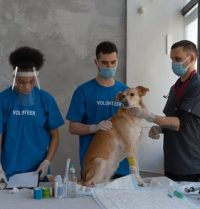Our pets are more than just furry companions; they’re members of our families. But unlike humans, they can’t verbally express themselves when feeling unwell. So, pet parents must be observant and vigilant in ensuring their pet’s good health.
This article will discuss key indicators and warning signs your pet may need veterinary attention.
Key Indicators of Pet Health Concerns
Odd Eating Habits
One of the first signs that something may be wrong with your pet is a change in their eating habits. Skipping a meal is not usually a cause for concern, but if your usually well-behaved pet starts raiding the pantry or going through the garbage, it’s time to schedule a vet appointment.
Excessive Thirst
Increasing water consumption can indicate potential health issues like kidney disease or diabetes. Refilling your pet’s water bowl more often than usual or noticing that they’re producing more urine may cause concern.
Rough or Dry Coat
A pet’s coat can provide valuable insight into their health. A healthy coat should be thick, shiny, and soft, whereas a dull, rough, or dry coat may indicate an underlying issue. Food allergies or skin diseases could be responsible for these changes, so it’s crucial to have your pet examined by a vet in such situations.
Lethargy and Sluggish Behavior
Another red flag is your energetic furball suddenly losing all interest in playing, taking walks, or engaging in its favorite activities. Lethargy may hint at an underlying health issue; if it lasts more than two days, it’s worth taking your pet to the vet.
Vomiting
Occasional vomiting is not uncommon in pets. However, recurrent bouts of vomiting, vomiting blood, or vomiting accompanied by a fever merit immediate veterinary attention.
Warning Signs That May Need Immediate Attention
Unusual Stool and Possible Causes
Monitoring your pet’s stool can provide vital information about their health. Signs of concern include worms, diarrhea lasting for more than 24 hours, straining, or blood and mucus in the stool.
Sudden Weight Loss
Unexpected weight loss, even in overweight pets, should be taken seriously. Numerous health conditions can be behind rapid weight loss, and early intervention is key to successful treatment.
Cloudy or Red Eyes
Cloudy or red eyes, squinting, or excessive eye discharge can indicate an infection or injury. Diseases affecting the eyes can progress rapidly, so do not hesitate to seek veterinary help.
Scooting or Dragging Rear
If your pet exhibits scooting or dragging its rear on the floor, consider it a signal to visit the vet. This behavior could stem from worms, blocked or infected anal glands, a urinary tract infection, or diarrhea.
Emergency Symptoms
Certain situations warrant immediate veterinary intervention. Seek help if your pet experiences any of the following:
- open wounds or possible broken bones
- stopped breathing or unconsciousness
- repeated vomiting or vomiting blood
- seizures, sudden collapse, or difficulty breathing
- bleeding from their mouth, nose, or eyes
- suspected poisoning
- extreme pain, or a stiff and swollen abdomen.
Preventative Measures for Pet Health
While early detection and timely treatment are essential, taking preventative measures can reduce the risk of health problems in your pets.
Regular Veterinary Visits
Routine veterinary check-ups are invaluable for early detection and prevention of health issues. During these visits, your pet’s overall health will be assessed, and necessary tests will be conducted.
Proper Diet and Exercise
Providing a well-balanced diet and ensuring your pet gets regular exercise will help maintain optimal health.
Grooming and Care
Regular grooming keeps your pet looking good and allows you to spot potential health problems early on.
Veterinary Surgery
Sometimes, your pet might require specialty surgery for dogs and cats. Complex procedures such as orthopedic surgery or tumor removal may be necessary to treat certain health conditions.
Parasite Prevention
Ensuring your pet receives regular parasite treatments and essential puppy vaccines is vital to prevent illnesses caused by parasites and infections.
Pet Wellness
Adopting a comprehensive approach to your pet’s well-being is the best way to ensure their long-term health. For additional information on pet wellness, visit this link, where you can find valuable resources and guidelines.
Conclusion
As pet parents, we must be attentive to changes in our pets’ behavior and appearance, as these can serve as valuable indicators of potential health issues. The key is to remain vigilant and take prompt action when needed. Your furry friend’s well-being depends on it.
Embrace a proactive approach to your pet’s health by following the preventative measures outlined in this article. After all, prevention is always better than cure when it comes to ensuring the health and happiness of our beloved pets.



